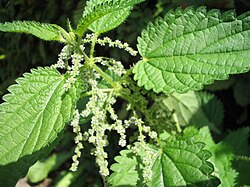Urtica
| Poisonous: | ☠ | Toxic sting |
|---|
| Features: | ✓ | edible |
|---|
|
Urtica > |
Nettle is the common name for between 30-45 species of flowering plants of the genus Urtica in the family Urticaceae, with a cosmopolitan though mainly temperate distribution. They are mostly herbaceous perennial plants, but some are annual and a few are shrubby.
The most prominent member of the genus is the stinging nettle Urtica dioica,[citation needed] native to Europe, Africa, Asia, and North America. The genus also contains a number of other species with similar properties, listed below.
Read about Urtica in the Standard Cyclopedia of Horticulture
|
|---|
|
Urtica (classical name, alluding to the burning hairs). Urticaceae. Nettle. About 30 annual and perennial erect simple or branching slender herbs, widely distributed, little if at all planted because of the stinging hairs and sts. and lvs.: fls. small, greenish and inconspicuous, racemose, spicate or clustered in the axils, monoecious or dioecious, sometimes hermaphrodite; sterile fls. with 4 sepals and 4 stamens; fertile fls. with 2 pairs of sepals and a single erect ovary: lvs. simple, opposite, strongly nerved, dentate or crenate or incised. Several species of nettle are native in N. Amer. and a few are intro. weeds. The plants have very little ornamental value. CH
|
Cultivation
Propagation
Pests and diseases
Species
Species in the genus Urtica, and their primary natural ranges, include:
- Urtica angustifolia Fisch. ex Hornem. 1819. China, Japan, Korea.
- Urtica ardens. China.
- Urtica atrichocaulis. Himalaya, southwestern China.
- Urtica atrovirens. Western Mediterranean region.
- Urtica cannabina L. 1753. Western Asia from Siberia to Iran.
- Urtica chamaedryoides (heartleaf nettle). Southeastern North America.
- Urtica dioica L. 1753 (stinging nettle or bull nettle). Europe, Asia, North America.
- Urtica dubia (large-leaved nettle). Canada.
- Urtica ferox (ongaonga or tree nettle). New Zealand.
- Urtica fissa. China.
- Urtica galeopsifolia Wierzb. ex Opiz, 1825, (fen nettle or stingless nettle). Europe. (Often considered a subspecies of Urtica dioica.)
- Urtica gracilenta (mountain nettle). Arizona, New Mexico, west Texas, northern Mexico.
- Urtica hyperborea. Himalaya from Pakistan to Bhutan, Mongolia and Tibet, high altitudes.
- Urtica incisa (scrub nettle). Australia.
- Urtica kioviensis Rogow. 1843. Eastern Europe.
- Urtica laetivirens Maxim. 1877. Japan, Manchuria.
- Urtica linearifolia. Creeping or Swamp Nettle. New Zealand.
- Urtica mairei. Himalaya, southwestern China, northeastern India, Myanmar.
- Urtica membranacea. Mediterranean region, Azores.
- Urtica morifolia. Canary Islands (endemic).
- Urtica parviflora. Himalaya (lower altitudes).
- Urtica pilulifera (Roman nettle). Southern Europe.
- Urtica platyphylla Wedd. 1856-1857. China, Japan.
- Urtica pubescens Ledeb. 1833. Southwestern Russia east to central Asia.
- Urtica rupestris. Sicily (endemic).
- Urtica sondenii (Simmons) Avrorin ex Geltman, 1988. Northeastern Europe, northern Asia.
- Urtica taiwaniana. Taiwan.
- Urtica thunbergiana. Japan, Taiwan.
- Urtica triangularisa
- Urtica urens L. 1753 (dwarf nettle or annual nettle). Europe, North America.
The family Urticaceae also contains some other plants called nettles that are not members of the genus Urtica. These include the wood nettle Laportea canadensis, found in eastern North America from Nova Scotia to Florida, and the false nettle Boehmeria cylindrica, found in most of the United States east of the Rockies. As its name implies, the false nettle does not sting.
Gallery
References
External links
- w:Urtica. Some of the material on this page may be from Wikipedia, under the Creative Commons license.
- Urtica QR Code (Size 50, 100, 200, 500)
